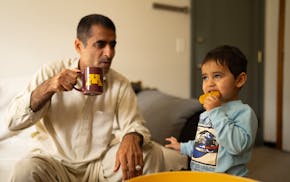The scene opens with two strangers sharing a park bench outside a hospital. They notice that each is carrying a small ball, and smile in weary recognition.
Balls, in this play, are symbols of caregiving.
"It's a secret club that we're all part of," the woman says.
"Eventually," he adds. "My wife."
"My mother," she says.
There's a bit more conversation about relatives and health conditions. Then, after a brief pause, the woman declares them both "bad-ass superheroes."
"Yes!" he says. "Juggling a thousand million balls."
"Until there's this special moment, if you can get them all up in the air in just the right way, where it feels like ..."
"They just magically float."
"That's the super-power," the woman says.
The scene is from "Thank You for Holding: The Caregiver Play Project," a play constructed from connected stories about different types and experiences of caregiving. The show, by St. Paul-based Wonderlust Productions, opened Friday in a cozy space at 825 Arts, previously known as Victoria Theater Arts Center, in St. Paul.
The exchange on the bench occurs near the end of the play but could just as easily be its introduction, embodying as it does some of the show's major themes surrounding caregiving. The play's 14 vignettes are inspired by stories collected from real people who speak from firsthand experience: health care providers and professional caregivers, as well as informal caregivers who had helped a relative or friend.
That's the procedure Wonderlust co-founders and co-artistic directors Alan Berks and Leah Cooper always follow when writing their plays, which peer into communities often overlooked or misunderstood. They solicit input from people who have firsthand experience around a topic. Subjects of previous plays have included people who work in the State Capitol and incarcerated people.
The technique is called "community-based theater," or "community-driven theater." Unlike regular community theater, some of the participants are professionals. But Wonderlust also casts community members and professional actors.
Berks and Cooper, who were formerly married and remain amiable professional partners, spent two years holding "story circles," gathering tales and observations from more than 150 professional and informal caregivers, diverse in jobs, ages, ethnicities and economic levels.
They recorded and kept transcripts from each circle. Then they, along with six other writers, fictionalized, fiddled with, rearranged and wove those personal accounts into a cohesive whole.
"Nothing in the play is really 100% fiction," Cooper said.
Artists, Berks said, often take the liberty of describing problems in the world they haven't experienced themselves. Wonderlust's method instead defers to the people who have actually lived it.
In turn, the plays often draw people who don't usually go to the theater, Berks said.
"A lot of people think they don't like theater because they don't expect it to be about them, don't expect it to matter," he said. "If you can bring people together and give them an entertaining theater experience that's actually about their lives, get them to feel maybe people understand and see them better, that's a powerful experience."
A 'transformative experience'
A few minutes into the scene on the park bench, the man mentions that he found himself caring for his wife quite unexpectedly. "I woke up one day to the reality that we don't have as much control as we thought."
Then he delivers a short monologue: "It's part of our love story. She is always still exactly the same person to me. No matter what happens to her body, or mind. She is always a whole person, and I know she sees that I see her, and she feels less alone and less scared. It was unthinkable to me before that two people could be so intimately involved with each other. The things I now do for her — wiping her, dressing her. The things she allows me to do for her. The total trust it requires and love for her to allow me. The unconditional love we share, body, mind and spirit, and I feel this incredible reverence."
Christin Lindberg recognizes that monologue. It contains some of her exact words.
Lindberg, a Minneapolis resident and research scientist for the Amherst H. Wilder Foundation, participated in one of the story circles. She talked about being a caregiver for her late husband, Roger Bechtel.
Lindberg and Bechtel had been together just five years when he was diagnosed with ALS (often called Lou Gehrig's disease). Bechtel died in 2021, just one grueling year after his diagnosis.
Lindberg joined the story circle at the suggestion of a member of Wonderlust's board of directors, a former theater student of Bechtel's at Carleton College in Northfield, who knew their back story.
Lindberg was impressed by Berks' and Cooper's methods. Their questions weren't simple or basic, but things like, "What do you remember of touch and smell and sound?"
In her day-to-day life, Lindberg rarely has conversations about caring for Bechtel — not because it makes her uncomfortable, but because it makes others uncomfortable. She found that being able to talk about him among people who'd had similar experiences was cathartic.
In the circle, she described the physical demands of caregiving, as well as "the terror and horror" of knowing the man she routinely calls "the love of my life" was going to die.
"I just felt like I could exhale, at some level, to be able to talk about it," she said.
Later, when the script for "Thank You for Holding" was completed, members of the story circles were invited to participate in a public reading. Lindberg was among those cast in the play, performing alongside professional actors.
Lindberg had no acting experience, but her husband had been an actor, playwright and director in addition to teaching. In "Thank You for Holding," she did not play herself but a character named Jess, a new employee in a program for people with disabilities.
Although she'd taken the role in honor of Bechtel, she was surprised to find it a "transformative experience" for herself.
"Just my understanding of my place in the world is different now," Lindberg said. "It's almost been like a spiritual epiphany. That can be a cliché, but it really has been a powerful personal transformation to me to be part of this process."
It's all about you
What Berks and Cooper particularly want to convey about caregiving is its inevitability. People tend to live their lives thinking it's something that happens to others. Then suddenly they find themselves as caregivers or recipients of care.
"The big lesson is, it is you," Berks said. "We all get old. We all get sick. Not a single person avoids those things."
Not long ago, Berks lost a friend who needed help as he was dying. Because the man had always cared for others, many were eager to be there for him.
"It was still terrible, but it was also beautiful," Berks said.
Berks and Cooper want to capture universal experiences, while also acknowledging that everybody's version is a little different.
"We always say, we're not telling 'the' story, we're telling 'a' story," Berks said. "But it is important to tell stories in a way people can enter."
One story circle they held was different from the others. It involved a group from the Karen community in Minnesota, indigenous people originally from eastern Myanmar and western Thailand.
As the conversation unfolded, Cooper noticed the Karen people's comments were not like those from groups of native-born Americans, who often spoke of feeling isolated as caregivers. At first, she wondered if there was some translation problem.
Then she realized their answers were unusual because their caregiving is so different. They live in multigenerational families and are accustomed to providing communal care for one another.
"It made me very much aware of how much American society does not place a value on communities of care," Cooper said. "We spend a lot of time thinking that it's not going to happen to us."
Despite our denial, aging, illness and disability "await us all," she said.
Berks and Cooper learned from the experience, too.
"Even though I do this work," Berks said, "It made me think: You just have to pay attention."
'Thank You for Holding: The Caregiver Play Project'
When: 7:30 p.m. Fri. & Sat.; 3 p.m. Sun. Ends Nov. 3.
Where: 825 Arts, 825 W. University Av., St. Paul.
Tickets: Pay-what-you-can from $5-$50. Suggested price, $25. info@wlproductions.org

Immigrant home cooks shine in new Twin Cities dinner series

Broders won't reopen Terzo restaurant in Minneapolis after flooding

Afghan allies struggle in Minnesota after funding cuts: 'What will I do?

Never mind the oldies — here are 10 younger acts to see this summer in Minnesota
